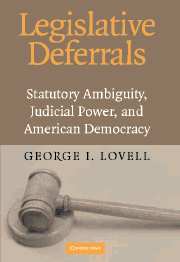Book contents
- Frontmatter
- Contents
- Acknowledgments
- Preface
- 1 Rethinking Judicial Policy Making in a Separation of Powers System
- 2 False Victories: Labor, Congress, and the Courts, 1898–1935
- 3 “As Harmless as an Infant”: The Erdman Act in Congress and the Courts
- 4 Killing with Kindness: Legislative Ambiguity, Judicial Policy Making, and the Clayton Act
- 5 The Norris-LaGuardia Act, for Once: Learning What to Learn from the Past
- 6 Legislative Deferrals and Judicial Policy Making in the Administrative State: A Brief Look at the Wagner Act
- 7 Conclusion
- Reference List
- References
- Index
6 - Legislative Deferrals and Judicial Policy Making in the Administrative State: A Brief Look at the Wagner Act
Published online by Cambridge University Press: 14 July 2009
- Frontmatter
- Contents
- Acknowledgments
- Preface
- 1 Rethinking Judicial Policy Making in a Separation of Powers System
- 2 False Victories: Labor, Congress, and the Courts, 1898–1935
- 3 “As Harmless as an Infant”: The Erdman Act in Congress and the Courts
- 4 Killing with Kindness: Legislative Ambiguity, Judicial Policy Making, and the Clayton Act
- 5 The Norris-LaGuardia Act, for Once: Learning What to Learn from the Past
- 6 Legislative Deferrals and Judicial Policy Making in the Administrative State: A Brief Look at the Wagner Act
- 7 Conclusion
- Reference List
- References
- Index
Summary
Even before court rulings on the Norris-LaGuardia Act signaled the end of the long-standing system of judicial regulation of labor in the United States, members of Congress were at work creating a new administrative system for regulating labor relations. That process culminated in 1935 when Congress enacted what is still the most important piece of labor legislation in American history, the National Labor Relations Act, more commonly known as the Wagner Act. The Wagner Act established a permanent administrative agency, the National Labor Relations Board (NLRB) and gave it the power to certify labor organizations as bargaining agents for groups of employees, to hear complaints and, with the supervision of the federal courts, to develop remedies against employers' “unfair labor practices.”
The Wagner Act also presents one of the most persistent and important puzzles in American politics and political development. On the surface, the act held out tremendous promise for labor organizations. The Wagner Act encouraged, facilitated, and protected certain kinds of organizing activities, and thus had the potential to transform American society and politics by nurturing an independent and politically powerful labor movement. Yet things did not turn out that way. All three branches of government have since retreated from Senator Wagner's original vision of using the administrative powers of the state to help workers improve their bargaining position in conflicts with employers.
- Type
- Chapter
- Information
- Legislative DeferralsStatutory Ambiguity, Judicial Power, and American Democracy, pp. 217 - 251Publisher: Cambridge University PressPrint publication year: 2003



